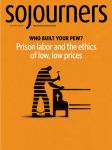PRAYER IS MOSTLY not a matter of getting what we lack; rather, as Thomas Merton taught at the very end of his life, it’s a means to experience what we already possess.
None of the gifts of the Spirit—“love, joy, peace, patience, kindness, generosity, faithfulness, gentleness, and self-control” (Galatians 5:22-23)—are fixed endowments. These are precarious resources, in the strict sense of the word “precarious,” which comes from the Latin precare, meaning “to pray.” These gifts must be rediscovered, relived, and newly explored, as we will in this Pentecost season.
It isn’t easy in threatening times to renew our gift of joy. Confronted by venality, xenophobia, denial, and ideological violence, we tense up and wear our grimness on our face as the badge of Christian moral seriousness. But without joy we are lost. Our scriptures teach us, when we take care to read between the lines, that the opposite of joy is not suffering but numbness. Joy is the partner, not the opponent, of a willingness to struggle, embrace pain, pay the costs of discipleship, and cross again to the dark side of the street where we meet those whom our society scapegoats and abandons. With the church in Rome, we shall hear again, “When we cry, ‘Abba! Father!’ it is that very Spirit bearing witness with our spirit that we are children of God, and if children, then heirs, heirs of God and joint heirs with Christ, sharing in Christ’s suffering and sharing in Christ’s glory” (Romans 8:15-17).
[ June 2 ]
“I Desire”
Acts 16:16-34; Psalm 97; Revelation 22:12-14, 16-17, 20-21; John 17:20-26
LEADING UP TO Pentecost, our readings vibrate with desire. At the Last Supper Jesus offers up a longing that these gathered friends will experience union with the glorified Jesus as a shared experience that will truly bind them together. “The glory that you have given me I have given them, so that they may be one ... I desire that those also, whom you have given me, may be with me where I am, to see my glory” (John 17:22, 24).
John’s gospel offers many of the New Testament’s strongest challenges to those who are tempted to separate the mystical from the missional and make intimate experience with God an opposite pole to the outreaching impetus toward mission. The life of experienced oneness with God is in fact the secret of attracting those who have not yet experienced the life of God for themselves. As Jesus prays, “may they also be in us, so that the world may believe that you have sent me” (17:21).
The final page of Revelation is scripture’s last word on the meaning of all that has gone before. It offers to all whose desire has been aroused the consummation of their yearning in what John the Revelator has called “the marriage feast of the Lamb.” “The Spirit and the bride say, ‘Come.’ ... And let everyone who is thirsty come. Let anyone who wishes take the water of life as a gift” (22:17, 18).
[ June 9 ]
In Other Languages
Acts 2:1-21; Psalm 104:24-34, 35b; Romans 8:14-17; John 14:8-17, 25-27
THE WRITER OF Acts is looking back two generations when describing the outpouring of the Spirit on the feast of Pentecost. Probably the earliest traditions represented the event as a spectacular instance of glossolalia. We know from Paul’s letters about this free-form ecstatic utterance and from modern Pentecostalism. It seems that this phenomenon had largely subsided by the time Acts was penned. The story is reshaped to prophesy the rippling out of Christian mission in ever widening circles. Fifty years after Christ’s resurrection the good news is being proclaimed in numerous languages; worship is adapting to different cultures in distant regions.
The church summoned into life by the Spirit is not monolingual or monocultural, but intrinsically diverse. The Acts writer implies that this diversity is not just pragmatic, but rooted in the Spirit’s advocacy for human differences, the Spirit’s bestowal on every human their own flame, honoring and transfiguring their own cultural distinctiveness. The wonder of Pentecost!—“How is it that we hear, each of us, in our own native language?” (Acts 2:8).
Today our preaching on Pentecost would do well to urge the question: “What does it take to rid the church of the vestiges of cultural hegemony, the unearned privileges and dominance of certain cultures, especially those that had the upper hand in the colonial epoch? How do we measure true revival in the Spirit in terms of renewed honor due to other languages spoken by Christians and seekers of different, and hitherto largely marginalized, cultures?”
[ June 16 ]
Vigilant Openness
Proverbs 8:1-4, 22-31; Psalm 8; Romans 5:1-5; John 16:12-15
PAUL'S CLAIM, in our reading from the letter to the Romans, that “hope does not disappoint us” (5:5) is provocative. Dashed hopes, failed projects, disillusioning setbacks, unrealized dreams are woven into the very texture of our experience. But, more often than not, the “hope” that let us down was mere wishful thinking. Paul is speaking of a gift that can only emerge from suffering, suffering that trains us in endurance, endurance that strengthens our character. Hope does not disappoint: It is what births in us the resilience to rise again on the third day from every disappointment. In the reading from John’s gospel, Jesus promises that the Spirit of truth will come to the disciples. The truth is not only what has been revealed and must be appropriated time and again. The Spirit will “declare to you the things that are to come” (16:13) since changing times and unprecedented challenges will call for vigilant openness to the new things that God desires to accomplish with and through us. What is hope, if not this courageous openness to the constant innovation of the Holy One?
Our reading from the book of Proverbs personifies the wisdom of God as an alluring teacher, a master artist, a prophetic voice, whose guidance for living in harmony with God is rooted in the very fabric of the universe. Wisdom has been God’s companion and co-worker from the very beginning of creation!
[ June 23 ]
Unlikely Hero
Isaiah 65:1-9; Psalm 22:19-28; Galatians 3:23-29; Luke 8:26-39
WE SHOULDN'T hesitate to call the lunatic whom Jesus cures on one of his expeditions into Gentile territory a kind of hero. Sometimes those who dramatically fall apart under the stress of intolerable social conditions are heroes. They take on the suffering of a whole people and their breakdown is a kind of terrible truth-telling. Don’t we encounter “heroes” like this living homeless on our streets, mirroring back to us the craziness of our broken social order? Living under an army of occupation is no picnic, and this pitiful man who camps out naked in the town graveyard, repeatedly shackled by the authorities, dramatizes his own people’s predicament. He even calls himself “Legion,” in bitterly ironic reference to the Roman military garrison stationed nearby.
Jesus’ arrival signals the end of this awful victim identity as the gruesome mascot of a people under enemy occupation. The exorcism Jesus performs includes a frightful negotiation with the demons, permitting them to execute their cunning exit strategy—“piggybacking” in a herd of swine! The plan is futile: The demons dramatically self-destruct. Jesus calmly gets the man fitted out with borrowed clothes and sends him home. His family must come to know him in his simple humanity and goodness, now that Jesus has set him free from the misguided need to perform as the ghastly icon of their downtrodden community, and has relieved him of the burden of bearing alone their unacknowledged communal pain.
[ June 30 ]
Tough and Tender
1 Kings 19:15-16, 19-21; Psalm 16; Galatians 5:1, 13-25; Luke 9:51-62
CHE GUEVARA'S burning clarity about his own rejection of nonviolence led him to declare himself “the contrary of a Christ.” But Che’s revolutionary passion sometimes flashes a brighter light on the gospel than well-meaning liberals can usually generate. “It is necessary to grow tough, but never lose our tenderness,” is a saying of his that has lodged in my heart since the ’60s. This week confronts us with the paradox of life in the Spirit as both tough, combative, fierce, and suffused with tenderness. The “sons of thunder” want Jesus to call down fire and brimstone on Samaritans afraid to offer them hospitality. Jesus sternly rebukes that kind of hard vindictiveness. And yet right away he makes demands on a man who wants to follow him—just after he completes his father’s funeral—which are scandalously tough: “Let the dead bury their own dead” (Luke 9:60).
Paul is equally insistent on living at the heart of the paradox of toughness and tenderness. He extols the fruits of the Spirit, “love, joy, peace, patience, kindness, generosity, faithfulness, gentleness and self-control” (Galatians 5:22-23). Yet, Paul is painfully direct about the need to root out from the heart all expressions of the “desires of the flesh,” those competitive urges that pit people against each other, fueling exploitation, and enslaving them with addictions. All this must be crucified. Pity the preachers this week who are used to weaving a soothing message from the scriptures!
“Preaching the Word,” Sojourners’ online resource for sermon preparation and Bible study, is available at sojo.net/ptw.

Got something to say about what you're reading? We value your feedback!







